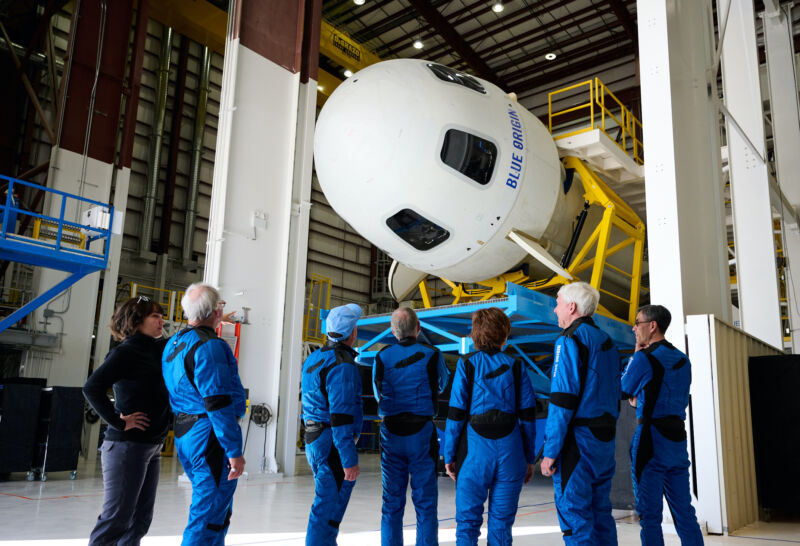
Welcome to Edition 4.37 of the Rocket Report! The big event this weekend is a wet dress rehearsal for NASA’s Space Launch System rocket, which begins on Friday and is presently scheduled to conclude on Sunday. Ars will have a full preview story on Friday morning, so be sure to check it out.
As always, we welcome reader submissions, and if you don’t want to miss an issue, please subscribe using the box below (the form will not appear on AMP-enabled versions of the site). Each report will include information on small-, medium-, and heavy-lift rockets as well as a quick look ahead at the next three launches on the calendar.

Virgin Orbit loses $157 million in 2021. In its first financial results since going public in December after a merger with a special purpose acquisition corporation, Virgin Orbit announced Tuesday a net loss of $157.3 million for 2021 on $7.4 million in revenue. That is compared to a net loss of $121.6 million on $3.8 million in revenue in 2020, SpaceNews reports. Despite the significant loss, the launch company emphasized in an earnings call the increase in revenue, primarily from two LauncherOne missions conducted in 2021.
Looking to diversify beyond orbital launch … Dan Hart, chief executive of Virgin Orbit, said there is growing interest in the company’s air-launch system, including from national security and international customers. The company also said its backlog grew from $86 million at the end of 2020 to $575 million at the end of 2021 (although only $152 million of that was in the form of binding agreements). Virgin Orbit is also considering playing a role in hypersonics. In terms of a launch target for 2022, Virgin Orbit aims to conduct between four and six flights of LauncherOne, down from its prediction of six in January. (submitted by Ken the Bin)
Blue Origin completes fourth human flight. After several unplanned holds, Blue Origin’s New Shepard launch system took flight on Thursday morning from the company’s spaceport in West Texas. The 10-minute suborbital flight took six passengers, including Blue Origin engineer Gary Lai, to an altitude of 106 km (see webcast). This was the company’s fourth human spaceflight aboard New Shepard and the first of 2022.
Private space tourism, for real … Blue Origin has completed 20 launches of New Shepard. Blue Origin engineers deserve credit for making suborbital space access seem almost routine with New Shepard and for ushering humanity into an era of private space tourism. They have work to do on cadence and bringing down costs, but New Shepard is proving to be a great machine.
Astra reports losses as well. In financial documents released on Thursday, the launch company reported a net loss of $257.8 million for the year 2021, up from $68 million in 2020. The company said, at the end of 2021, it had $325 million in cash and cash equivalents. In its release, the company noted that it had “completed two out of three orbital launches since our last quarterly results call on November 11, 2021.”
Betting on a big backlog … Although it hasn’t demonstrated a superhigh success rate just yet, Astra is moving toward a near-monthly launch cadence. And as it scales up launch operations, Astra says it has plenty of customers ready to go. “Our customers continue to value Astra’s launch services as our backlog increased to $160 million during 2021,” said CFO Kelyn Brannon.
Virgin Galactic names Kelly Latimer as director of flight test. The company announced Wednesday that veteran pilot and retired US Air Force Lt. Col. Kelly Latimer has been promoted to director of flight test. Latimer joined Virgin Galactic in 2015 as its first female test pilot. She currently serves as a pilot for the mothership, VMS Eve, and was pilot in command for the Unity 21 mission. She will continue to serve as a Virgin Galactic pilot.
So much work ahead … Now, Latimer will oversee the entirety of the company’s flight test program, including design, planning, execution, and post-flight analysis. She will supervise the completion of the flight test program for Virgin Galactic’s current fleet; that program is scheduled to resume later this year and will work in parallel on the development of the company’s new motherships and Delta-class spaceships.
SEC seeks to tighten rules on SPACs. A number of US launch companies have recently used special purpose acquisition companies, or SPACs, to go public and raise much-needed capital. Essentially, this is a process by which a publicly traded shell company acquires a private company for the purpose of taking that second company public. The SPAC process allows the private company to circumvent the traditional Initial Public Offering, or IPO process, which entails a lot of scrutiny of a company’s financial record.
Protecting investors … As the SPAC process has come to the space industry, there have been plenty of, shall we say, rosy financial outlooks offered by commercial space company executives to potential investors. We’ve already seen some investor lawsuits, and we’ll very likely see more. On Wednesday, the US Securities and Exchange Commission issued some proposed rules that will require SPACs to increase disclosure and will protect investors. “Functionally, the SPAC target IPO is being used as an alternative means to conduct an IPO,” said Gary Gensler, chair of the commission. “Thus, investors deserve the protections they receive from traditional IPOs.”
https://arstechnica.com/?p=1844086

